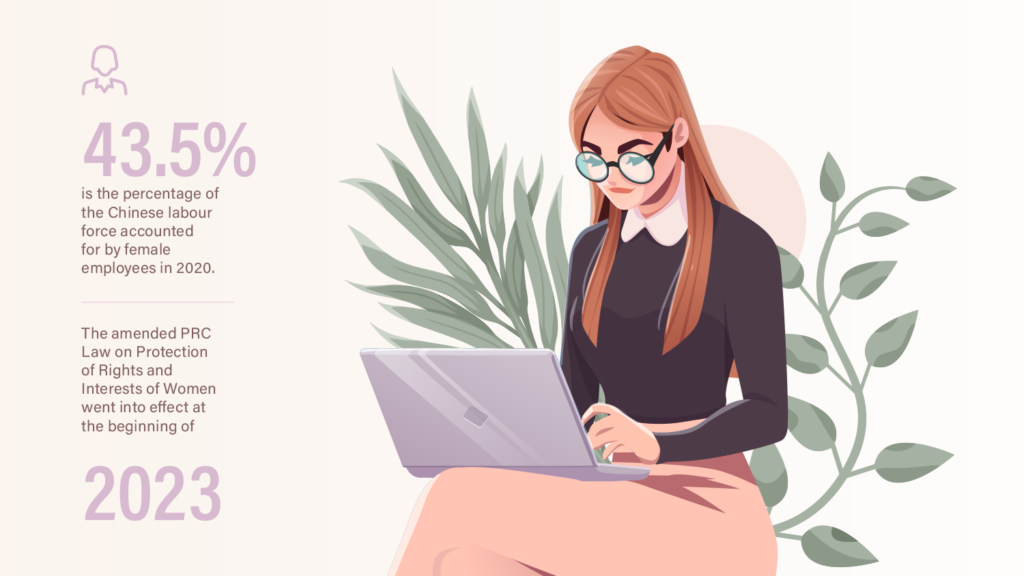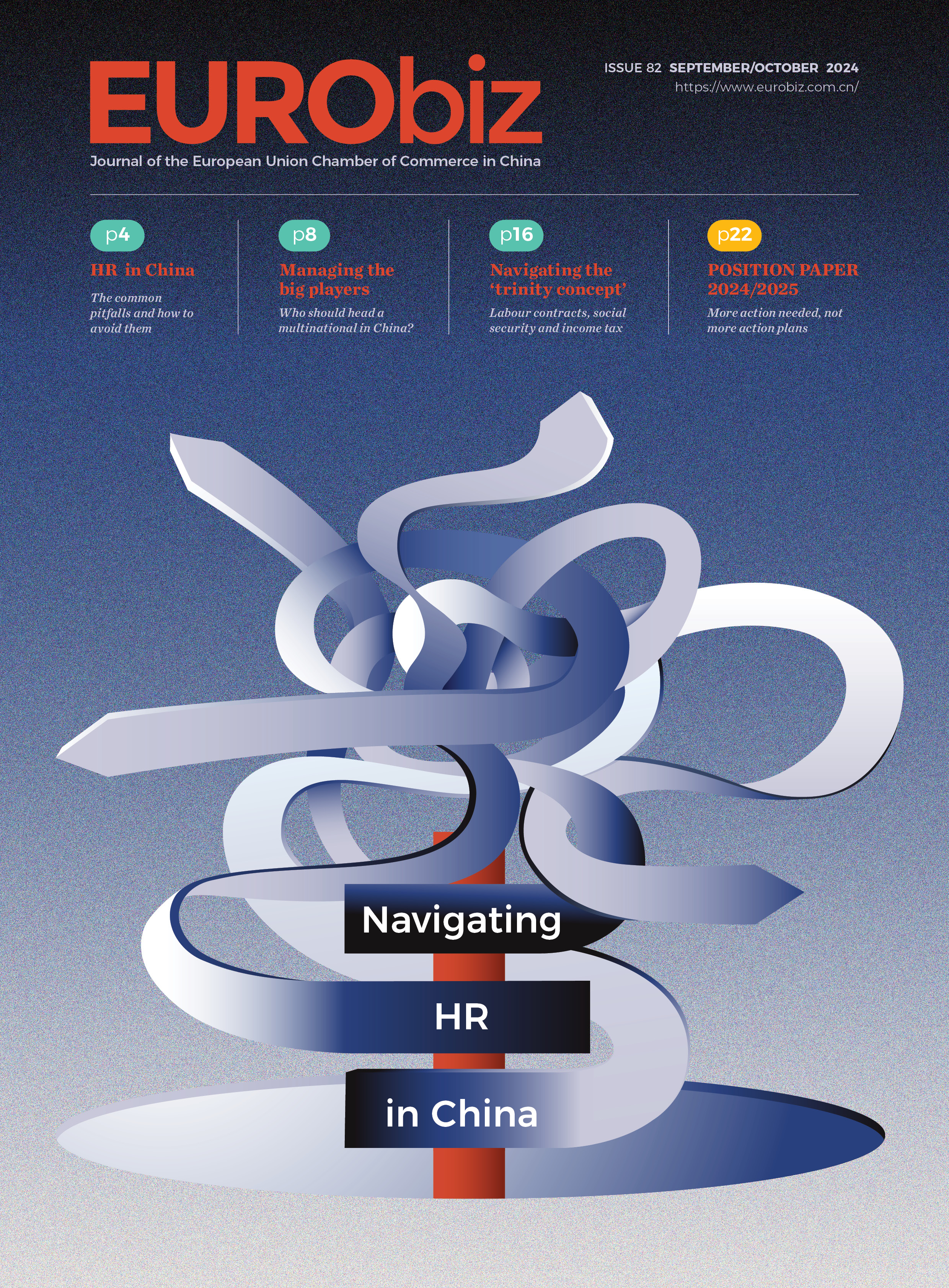
New regulatory updates in China
Women play an important role in Chinese society: in 2020, Chinese female employees reached 67 million, accounting for 43.5 per cent of the labour force.[1] However, women are often discriminated against during recruitment and at the workplace, and new legislation to better protect their rights has recently been promulgated. Jeanette Yu of CMS Legal looks at the current Chinese regulatory requirements and their updates for employers in relation to the protection of women’s rights and interests in the workplace.
Over the years, China has promulgated several laws and regulations on the protection of women at the workplace. They include but are not limited to the People’s Republic of China (PRC) Labour Law.[2] The PRC Labour Contract Law[3] and the Special Regulations on Labour Protection of Female Employees[4] as well as related rules and regulations at the state-level or issued by local governments. On 1st January 2023, the PRC Law on the Protection of Rights and Interests of Women (New Law) was amended and became effective,[5] outlining specific obligations for employees.
The New Law focusses on eliminating gender discrimination against women at the workplace and provides in detail the statutory requirements for employers.
- At the recruitment stage, employers are explicitly prohibited from taking discriminatory actions towards female candidates. Unless the law provides otherwise, employers cannot hire only males; specify that males are preferred for a position; inquire about a female candidate’s marriage and childbirth status; ask a female candidate to do a pregnancy test in on-board physical examinations; or set restrictions on marriage or childbirth intention or status as a condition for employment. The employer shall not refuse to recruit women on the grounds of gender or raise recruitment standards for women by other means. Some of these prohibitions had already been introduced through regulations, but are now provided by law.
- During employment, employers shall aim to ensure a fair working environment and adhere to the principle of equality between male and female employees in terms of salary and benefit treatment or when deciding on promotions, evaluating and recognising professional titles, or providing training opportunities. In particular, the marriage status of female employees, or the fact that they are pregnant, on maternity leave or nursing a baby, should not affect their consideration for promotion or training opportunities, or the evaluation and recognition of their professional titles.
- According to the New Law, gender equality at the workplace will be incorporated into the scope of labour security supervision conducted by the labour administrative authority. Due to this change, rather than having to go to labour arbitration as was previously the case, female employees now make complaint directly to the competent labour administrative authority. If the complaint is verified, the authority is entitled to ask the employer to make rectification. If the employer refuses to do so, or the circumstances of the case are of a serious nature, the authority can impose a penalty of Chinese yuan (CNY)10,000–50,000 on the employer.
According to the laws and regulations applicable in the past, women enjoy special labour protection at the workplace. They include the following:
- Female employees are prohibited by law from taking certain kinds of work such as underground and mining work, or doing certain types of work (for example, intensive physical labour work) during the menstrual period or pregnancy, maternity and nursing periods.
- Female employees enjoy leave entitlement (such as maternity leave, pregnancy inspection leave, nursing period, and so on), salary guarantees, and overtime and night work exemption during the pregnancy, maternity and nursing periods.
- Female employees enjoy special protection against termination of contract during the pregnancy, maternity and nursing periods. They shall not be dismissed due to illness, incompetence, change of objective circumstances or be mass laid-off during these periods. If a female employee’s employment contract expires during these periods, the term of contract will be automatically extended until the periods expire.
In addition to the above, the New Law imposes several new obligations on employers as follows:
- Employers must include special protection clauses for female employees in their employment contracts. If there is a collective contract, special protection clauses for female employees shall be included, or the employer should have a specific collective contract for female employees.
- Employers shall regularly arrange health examinations specific to female employees, such as gynecological or breast disease screenings.
- During pregnancy, maternity or nursing periods, in addition to salary, employers shall also not reduce female employees’ welfare and benefits.
Further, the New Law requires employers to adopt measures to prevent sexual harassment at the workplace. This is the first time that statutory requirements in this regard are written into law at the national level in China. According to the New Law:
- Employers are obliged to take measures to prevent the occurrence of sexual harassment at the workplace, such as formulating relevant rules and regulations, specifying the responsible organisation or person in charge, carrying out relevant education and training programmes, adopting necessary safety and security measures, setting up complaint hotlines and establishing investigation procedures.
- if any cases of harassment are reported, the employer should handle disputes in a timely manner. During the investigation process, the employer should protect the privacy and personal information of the parties concerned, support female victims in safeguarding their rights, and provide psychological counselling to female victims where necessary.
- if an employer fails to take necessary measures in preventing sexual harassment, resulting in the infringement of women’s rights or negative impacts the society, the employer may be ordered by the competent authority to make rectification. If the employer refuses to rectify or it is a severe violation, the person directly in charge and other persons directly responsible for the company may be punished according to law.
The amended PRC Law on Protection of Rights and Interests of Women went into effect at the beginning of 2023. In order to comply with the new legal requirements, companies may wish to revisit their employment documents and human resource policies, especially their employee handbook and template employment contract, to check if any amendments are required. Companies may also wish to review their current employment process and labour protection practice, and make necessary adjustments.
Jeanette Yu is partner, and head of Employment and
Pensions, of CMS Legal China, and
is based at their Shanghai office. She has more than 20 years’ experience in
providing legal advice for international companies on Chinese labour law and
compliance management issues. Since 2017, Jeanette has also been acting as the
national chair/vice chair of the Human Resources Working Group of the European
Chamber.
[1] Final Statistical Monitoring Report on the Program of the Development of Chinese Women (2011–2020), National Bureau of Statistics of China, 31st December 2022, viewed 21st March 2023, <http://www.stats.gov.cn/tjsj/zxfb/202112/t20211221_1825520.html>
[2] The PRC Labour Law, National People’s Congress, 7th January 2019, viewed 27th March 2023, <http://www.npc.gov.cn/npc/c30834/201901/ffad2d4ae4da4585a041abf66e74753c.shtml>
[3] The PRC Labour Contract Law, People’s Government of Guangdong Province, 6th December 2022, viewed 27th March 2023, <http://www.gd.gov.cn/zwgk/wjk/zcfgk/content/post_2521208.html>
[4] Special Regulations on Labour Protection of Female Employees, 18th April 2012, viewed 27th March, <http://www.gov.cn/zhengce/2020-12/27/content_5574753.htm>
[5] The PRC Law on Protection of Rights and Interests of Women, National People’s Congress, 30th October 2022, viewed 27th March 2023, <http://www.npc.gov.cn/npc/c30834/202210/d80092ae46b24946b30b3a880c2f2be5.shtml>


Recent Comments